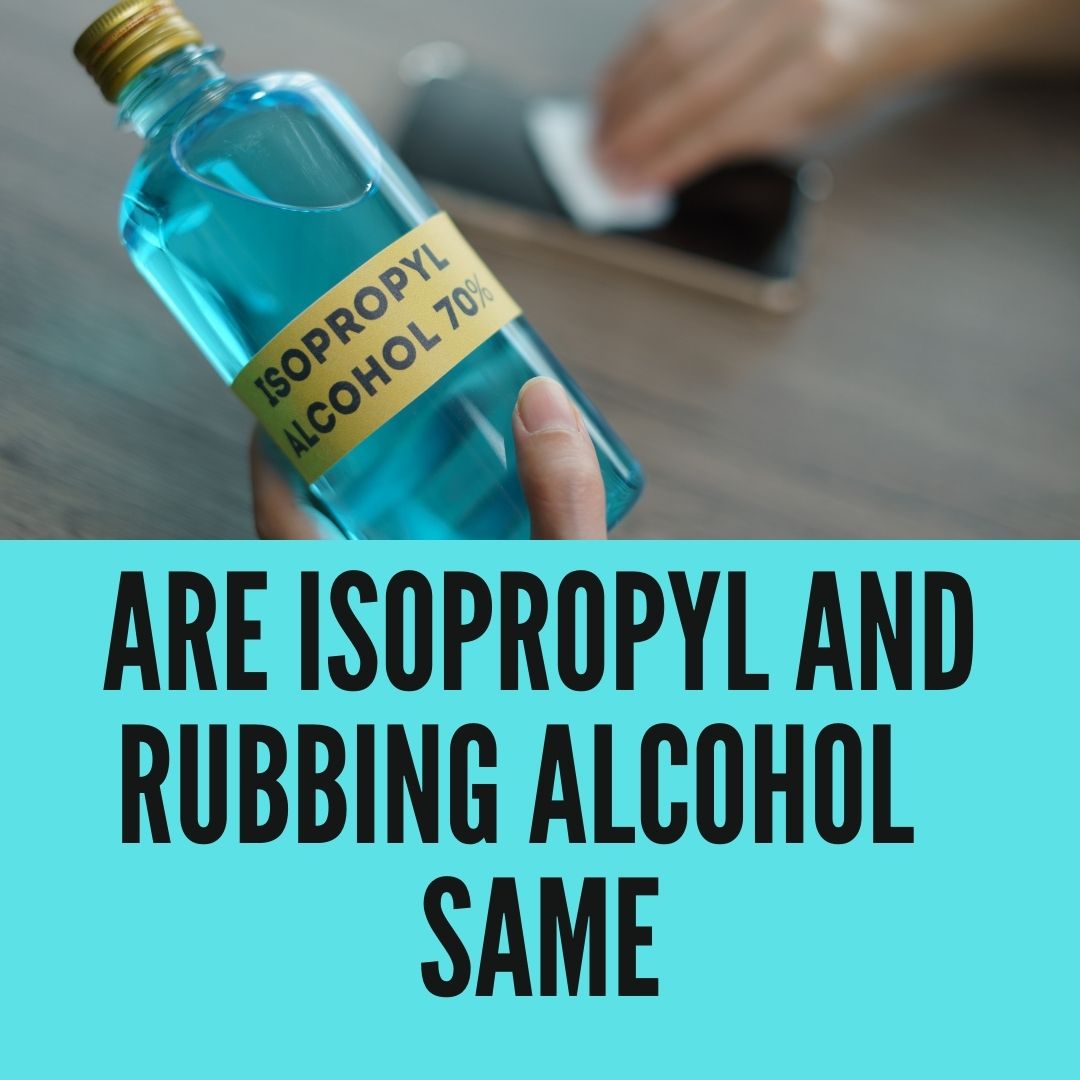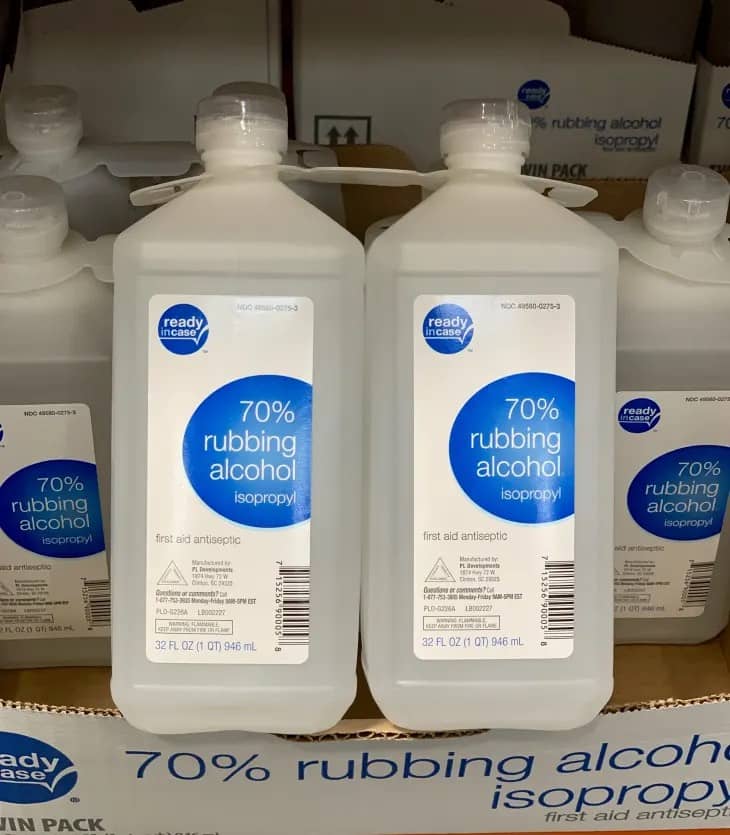
Whether you’re trying to treat an ear infection or if you’re just looking to disinfect around the house, rubbing alcohol is a versatile substance that everyone should have in their medicine cabinet. However, have you ever considered the difference between rubbing alcohol and isopropyl? That’s what I’ll be looking at today.
So are isopropyl and rubbing alcohol the same? Isopropyl is a form of rubbing alcohol, though the more common variety of rubbing alcohol is mainly made out of ethanol. Isopropyl is a bit more of an effective solvent than ethanol rubbing alcohol, though this is offset by its higher price and relative rarity.

The differences between rubbing alcohol and isopropyl are too numerous to sum up neatly in such a short paragraph, so I’ll be going over the subject in greater depth in the following paragraphs. I’ll discuss the key differences between these two forms of rubbing alcohol and recommend some cases in which you should use one over the other.
What’s the Difference Between Rubbing Alcohol and Isopropyl?
Rubbing alcohol comes in many different forms, and the two most common ones are isopropyl and ethanol. There are a few key differences between the two forms of alcohol, including the following:
- Price and ease of access
- Potency as a disinfectant
- Toxicity
- Effectiveness as a solvent
Price and Ease of Access
One of the most important things to consider is whether or not you can get your hands on the type of rubbing alcohol that you’re looking for. Out of the two varieties, ethanol or ethyl alcohol is a lot easier to find because it is produced in greater numbers for consumer use.
This is because ethanol is essentially drinking alcohol, but when sold as rubbing alcohol, it has been denatured so that it can’t be consumed by people looking to circumvent tax laws. This means that the production capacity for ethanol is much larger than that of isopropyl, which has more niche applications.
Since isopropyl alcohol is relatively rare in pharmacies, it will often be more expensive than ethanol. This issue has been exacerbated by the COVID-19 pandemic, as isopropyl alcohol is a more popular choice of rubbing alcohol for the production of hand sanitizers.
Since almost all isopropyl alcohol that’s being produced is currently being used to create hand sanitizer, you’re more likely than ever to struggle with finding it available for household use. On the flipside, ethanol rubbing alcohol may be a little harder to find, but it should still be stocked in larger stores or pharmacies.
Potency as a Disinfectant
While isopropyl and ethanol are both structurally-similar, they both have a few key molecular and structural differences that make them different. These small differences make each of them more or less effective as a disinfectant.
Isopropyl is more frequently used as a disinfectant compared to ethanol because it is more efficient at doing the job. This means that isopropyl can be used in lower concentrations to create things like disinfecting sprays and hand sanitizers, making it a more economical choice for manufacturers.
To compare the two, isopropyl is effective at killing pathogens and viruses at concentrations as low as 40% to 60%. To get the same results out of ethanol, the concentration has to be bumped up to between 70% and 90%, depending on the resilience of the pathogen that you’re trying to kill.
Having a lower concentration of alcohol in a solution surprisingly increases the effectiveness because of the larger volume of water that’s present in it.
Since the cells of pathogens will more readily accept water than alcohol, the water acts as a pathfinder for the alcohol, allowing it to follow in its footsteps into the nucleus of the cell, killing it more effectively.
Toxicity
There is also a significant difference in how toxic each form of alcohol is, despite the relatively small chemical differences between ethyl and isopropyl alcohol. This heightened toxicity isn’t exactly the reason why isopropyl is a more capable disinfectant, but it is why you should be more careful when handling it.
Ethyl alcohol is essentially drinking alcohol, as we mentioned earlier, though it has been put through a denaturing process so that it can be sold as rubbing alcohol. This is to comply with tax regulations and to ensure that people can’t buy rubbing alcohol to circumvent said regulations, as they did back during Prohibition.
Denaturing consists of putting a toxin or bitterant in ethanol so that it can’t be safely consumed by people. While this renders ethyl alcohol toxic, it is still not as toxic as isopropyl, since there is a much smaller concentration of toxic ingredients. Regardless, ethanol rubbing alcohol can and will injure or kill you if consumed, so never ingest it.
On the other hand, isopropyl alcohol is toxic by its very nature, so it doesn’t have to be denatured with additives. This also makes isopropyl much more toxic than ethanol since there is a higher concentration of toxins in a bottle. While they’re both potentially deadly, isopropyl alcohol is potentially a lot deadlier.
Effectiveness as a Solvent
The final difference between these two forms of rubbing alcohol will also impact how effective they’ll be at cleaning. While both ethanol and isopropyl alcohol can be used as effective household cleaners, you’ll find that isopropyl is far more effective at cleaning up grease and acrylic stains.
This is because isopropyl is a more effective solvent than ethyl alcohol, and you can verify this by trying to clean something like resin with both of them. While ethanol will typically leave a residue behind, isopropyl will often completely eradicate any signs of the mess that was previously there.
This has the added benefit of making isopropyl a more cost-effective choice for cleaning off things that need to be broken down by a solvent, as you’ll need more than twice as much ethanol to match its effectiveness. While this may be somewhat offset by the higher price of the iso alcohol, it will also save you time and effort.
Here are some other posts that might interest you:
- Rubbing Alcohol: The Ultimate Dandruff Killer?
- Can You Mail Rubbing Alcohol?
- Can You Mix Rubbing Alcohol and Vinegar?
- Is Nail Polish Remover Rubbing Alcohol?
- Can I Use Rubbing Alcohol To Clean My Keyboard?

My name is Logan, and I’m a 36-year-old dad who owns a small pressure-washing company in the suburbs of Atlanta, Georgia. My main goal with rubbing-alcohol.com is to show you how versatile isopropyl rubbing alcohol can be! I hope. You find it useful.
